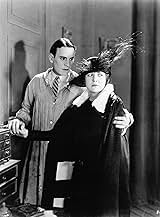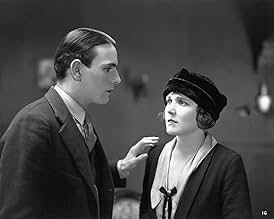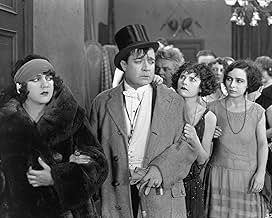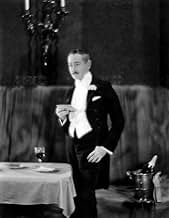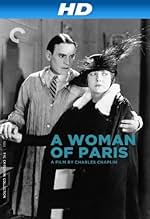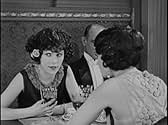CALIFICACIÓN DE IMDb
6.9/10
6.7 k
TU CALIFICACIÓN
Una mujer mantenida se encuentra con su exprometido y se encuentra dividida entre el amor y el confort.Una mujer mantenida se encuentra con su exprometido y se encuentra dividida entre el amor y el confort.Una mujer mantenida se encuentra con su exprometido y se encuentra dividida entre el amor y el confort.
- Premios
- 3 premios ganados en total
Charles K. French
- Jean's Father
- (as Charles French)
Nellie Bly Baker
- Masseuse
- (sin créditos)
Henry Bergman
- Head Waiter
- (sin créditos)
Charles Chaplin
- Station Porter
- (sin créditos)
Frank Coghlan Jr.
- Boy
- (sin créditos)
Antonio Corsi
- Accordion Player
- (sin créditos)
Harry d'Abbadie d'Arrast
- Man in Nightclub
- (sin créditos)
Stella De Lanti
- Revel's Fiancée
- (sin confirmar)
- (sin créditos)
Jean de Limur
- Man in Nightclub
- (sin créditos)
Charles Farrell
- Man in Nightclub
- (sin créditos)
Bess Flowers
- Mannequin
- (sin créditos)
- Dirección
- Guionista
- Todo el elenco y el equipo
- Producción, taquilla y más en IMDbPro
Opiniones destacadas
'A Woman of Paris' is rather a curiosity in Charles Chaplin's filmography. It stands as the only pure drama he wrote and directed. The film he made just to help foster Edna Purviance's career independent from him. This film was Edna's first and practically the last leading role ('A Woman of the Sea' from 1926 was never released and is now considered to be lost), which, of course, is a pity, because besides being gorgeous, she was a fine actress, and was able to shine on her own not only as of the sidekick of The Tramp. The complex role Marie St. Clair proved that. The film itself was a failure at cinemas not because it was bad (critics at that time liked it), but because Chaplin wasn't in it (only for a brief cameo - a man carrying the box in the trainstation). And it was, oh the horror! a drama.
I guess that's the reason, why Chaplin never tried his hand at a serious movie ever again (although he experimented with quite risky stuff later in his career). That's another pity - because Chaplin truly knew how to create complex characters amid moral turmoils and dilemmas. 'A Woman of Paris' is undoubtedly with flaws. Well, it was practically Chaplin's second feature film and the first time where he ventured that far from his comfort zone.
Altogether, 'A Woman in Paris' is a good drama (probably a bit overly melodramatic by the end), and needs more recognition from Chaplin fans and all silent cinema admirers alike. It really shows that Chaplin was much more diverse and deep as a filmmaker than just offering magnificent laughs.
I guess that's the reason, why Chaplin never tried his hand at a serious movie ever again (although he experimented with quite risky stuff later in his career). That's another pity - because Chaplin truly knew how to create complex characters amid moral turmoils and dilemmas. 'A Woman of Paris' is undoubtedly with flaws. Well, it was practically Chaplin's second feature film and the first time where he ventured that far from his comfort zone.
Altogether, 'A Woman in Paris' is a good drama (probably a bit overly melodramatic by the end), and needs more recognition from Chaplin fans and all silent cinema admirers alike. It really shows that Chaplin was much more diverse and deep as a filmmaker than just offering magnificent laughs.
I was looking in Charlie Chaplin's memoirs and I found that his original idea for the plot of A Woman Of Paris came from pillow talk with Peggy Hopkins Joyce involving one of her former boyfriends, a French publisher. From this came Charlie's idea to direct, but not appear in a film and hopefully make his long time leading lady from slapstick comedy, Edna Purviance a major dramatic star.
The reason given for the non-success of A Woman of Paris is usually given as the fact that people bought tickets and were disappointed that they did not see a Charlie Chaplin comedy. Probably on the silent screen, star images were even more fixed in people's minds than they were when sound came in.
But seeing it today it really does go overboard into melodrama. Edna's a simple country girl who loves Carl Miller, a struggling artist. Some blind mischances of fate and she winds up the paid woman of Parisian rake Adolphe Menjou. It's the tragedy of one romantic and the salvation of sorts for the other that are the basis of the story.
You couldn't make a film like it today, audiences would just laugh at it. In 1923 audiences were looking for laughs attached to the Chaplin name and found none. Edna does a fine job, but the public would not accept her in a drama. Adolphe Menjou as the rake comes off best in the cast.
The film ironically enough was Chaplin's first for the newly formed United Artists of which he was a quarter interest partner. After this one failed at the box office, he went back to cranking out the comedies we expected from him.
Back when I was working person at New York State Crime Victims Board, I had a claimant named Wayne Purviance who was the victim of an anti-gay bias attack in 1982. It was a crime that galvanized the GLBT people of New York City, this person in particular. Wayne was the grand nephew of Edna Purviance.
He's no longer among the living, but to you Wayne Purviance who took some real blows for millions of people, this review is lovingly dedicated to you and your wonderful aunt.
The reason given for the non-success of A Woman of Paris is usually given as the fact that people bought tickets and were disappointed that they did not see a Charlie Chaplin comedy. Probably on the silent screen, star images were even more fixed in people's minds than they were when sound came in.
But seeing it today it really does go overboard into melodrama. Edna's a simple country girl who loves Carl Miller, a struggling artist. Some blind mischances of fate and she winds up the paid woman of Parisian rake Adolphe Menjou. It's the tragedy of one romantic and the salvation of sorts for the other that are the basis of the story.
You couldn't make a film like it today, audiences would just laugh at it. In 1923 audiences were looking for laughs attached to the Chaplin name and found none. Edna does a fine job, but the public would not accept her in a drama. Adolphe Menjou as the rake comes off best in the cast.
The film ironically enough was Chaplin's first for the newly formed United Artists of which he was a quarter interest partner. After this one failed at the box office, he went back to cranking out the comedies we expected from him.
Back when I was working person at New York State Crime Victims Board, I had a claimant named Wayne Purviance who was the victim of an anti-gay bias attack in 1982. It was a crime that galvanized the GLBT people of New York City, this person in particular. Wayne was the grand nephew of Edna Purviance.
He's no longer among the living, but to you Wayne Purviance who took some real blows for millions of people, this review is lovingly dedicated to you and your wonderful aunt.
A melodrama rather than the saucy Parisian comedy the title and the name of Charles Chaplin suggests. Promptly withdrawn by its creator, 'A Woman of Paris' was for over half a century one of those films whose reputation was based upon it's unavailability for reappraisal and like many of Chaplin's later films was to prove a disappointment when it was finally revived in the 1970s.
Both the plot and the wardrobe worn by Chaplin's leading lady Edna Purviance evokes the era of Chaplin's fellow United Artist D. W. Griffith rather than the continental sophistication suggested by the title, while the presence of Adolphe Menjou happily anticipates the nascent sophistication of the twenties.
Both the plot and the wardrobe worn by Chaplin's leading lady Edna Purviance evokes the era of Chaplin's fellow United Artist D. W. Griffith rather than the continental sophistication suggested by the title, while the presence of Adolphe Menjou happily anticipates the nascent sophistication of the twenties.
Charles Chaplin is noted for his comedy performances, and deservedly.
His direction, though, should be more highly regarded, if only for this one motion picture.
Compare the quality of the photography and the smoothness of the editing to, for example, "The Gold Rush," of about the same time.
"A Woman of Paris" is very modern; "The Gold Rush" is downright primitive (but, in spots, brilliant).
"A Woman of Paris" also shows some admirable acting talent in, really, all the players. Some of the lesser characters are still played beautifully, despite being "lesser," especially Marie's maids and her, more or less, friends, and very especially the masseuse.
And the scene where the artist's mother, played by Lydia Knott, bent on revenge, comes upon Marie -- with no words, just body movement and facial expression -- she tells the audience what the proverbial thousand words could not so well.
Credit for part of that good acting must, of course, go to the director, but even the best director can't make much of poor actors.
Chaplin had very good actors. Adolphe Menjou reached stardom, and deservedly. What a tremendous talent; he could do everything.
Edna Purviance should have achieved much more acclaim. She performed admirably, especially in this movie, and she was attractive. Fame is certainly fickle.
In some ways, "A Woman of Paris" might be written off by a few as "soap opera." But it is well worth watching for the performances and, especially, for the directing.
His direction, though, should be more highly regarded, if only for this one motion picture.
Compare the quality of the photography and the smoothness of the editing to, for example, "The Gold Rush," of about the same time.
"A Woman of Paris" is very modern; "The Gold Rush" is downright primitive (but, in spots, brilliant).
"A Woman of Paris" also shows some admirable acting talent in, really, all the players. Some of the lesser characters are still played beautifully, despite being "lesser," especially Marie's maids and her, more or less, friends, and very especially the masseuse.
And the scene where the artist's mother, played by Lydia Knott, bent on revenge, comes upon Marie -- with no words, just body movement and facial expression -- she tells the audience what the proverbial thousand words could not so well.
Credit for part of that good acting must, of course, go to the director, but even the best director can't make much of poor actors.
Chaplin had very good actors. Adolphe Menjou reached stardom, and deservedly. What a tremendous talent; he could do everything.
Edna Purviance should have achieved much more acclaim. She performed admirably, especially in this movie, and she was attractive. Fame is certainly fickle.
In some ways, "A Woman of Paris" might be written off by a few as "soap opera." But it is well worth watching for the performances and, especially, for the directing.
A Woman Of Paris was an acclaimed success with the critics when it was Originally released on 1st October 1923. However, the audience despised it as they wanted to see Charlie Chaplin the tramp starring in a film not a film directed by Chaplin in which he does not appear (albeit in a small cameo role). When i first saw the film on BBC2 around Christmas 1998 i thought Chaplin had a starring role so was naturally disappointed when i found out this wasn't the case. However, since then i have become a huge fan of Chaplin and all his work so now I think this film is rated among Chaplin's best features. His musical score composed in 1976 with Eric Rogers was Chaplin's last ever work in his film career which spanned 62 years. By 1976 Chaplin was very frail and struggled to communicate so the fact that he could compose the music for a near 80 minute film is amazing and the fact that the music score is as good as any of his other films is also astonishing. Charles Chaplin was a true genius of Cinema and A Woman Of Paris is an excellent example of Chaplin as director, writer and composer.
¿Sabías que…?
- TriviaThe reissue of this film, with a musical score and new cut by Sir Charles Chaplin, was the last work of his entire film career. By then, the 87-year-old Chaplin was visibly frail but still walking. His score was aided by arranger Eric James, and he took a small theme from Monsieur Verdoux, el moderno Barba Azul (1947), but most of the score was Chaplin's. The film was reissued posthumously in 1977 with the new score to overwhelming critical and public praise. At that time, many critics praised it (as in the trailer) as one of the best films ever made.
- ErroresWhen Jean starts fighting with Pierre in the restaurant, Pierre's glass of wine or champagne gets knocked over. When Pierre sits down on the table afterwards, the glass stands on the table filled with drink as if it hadn't been knocked over.
- Citas
[Intertitle]: Time heals, and experience teaches that the secret of happiness is in service to others.
- Versiones alternativasDuring 1976, Chaplin was preparing a reissue of A Woman of Paris/Sunnyside but died before completion. The project was completed after his death, and the films were reissued in the United States by Kino International Corp. in 1978. This version, however, dispensed with an opening subtitle, as well as a few brief insert shots.
- ConexionesFeatured in Chaplin Today: Modern Times (2003)
Selecciones populares
Inicia sesión para calificar y agrega a la lista de videos para obtener recomendaciones personalizadas
- How long is A Woman of Paris: A Drama of Fate?Con tecnología de Alexa
Detalles
- Fecha de lanzamiento
- País de origen
- Sitio oficial
- Idioma
- También se conoce como
- A Woman of Paris: A Drama of Fate
- Locaciones de filmación
- Productora
- Ver más créditos de la compañía en IMDbPro
Taquilla
- Presupuesto
- USD 351,000 (estimado)
- Total a nivel mundial
- USD 12,921
- Tiempo de ejecución
- 1h 22min(82 min)
- Mezcla de sonido
- Relación de aspecto
- 1.33 : 1
Contribuir a esta página
Sugiere una edición o agrega el contenido que falta

